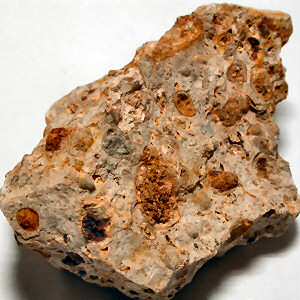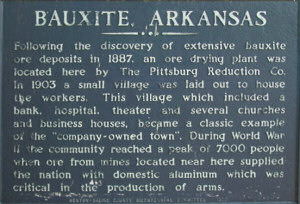Arkansas State Rock
| Bauxite |
|
Adopted:February 22, 1967 |
 |
| Bauxite: Arkansas State Rock |
Adoption of the Arkansas State Rock
Senate Bill No. 143 was introduced in the 45th General Assembly of the Arkansas State Legislature by Senators J. Hugh Lookadoo, Robert Harvey, and Olen Hendrix. It proposed that the diamond be named the state's official gem, that the quartz crystal be named the state's official mineral, and that bauxite be named Arkansas' official state rock.
The legislation was not, as might be expected, sponsored by mining interests in the state, but was backed by Arkansas mineral collectors and clubs in order to support the exchange of "official" state gems, minerals and rocks between individual collectors and clubs in other states. According to the web site of the Central Arkansas Library System, "... the text of the bill asserted that passage was essential in order that collectors and hobbyists might trade official state gems, rocks, and minerals with like-minded enthusiasts in other states."
Senate Bill No. 143 was passed in both houses of the Arkansas State Legislature and signed into law by Governor Winthrop Rockefeller on February 22, 1967.
Bauxite is named after the Les Baux region of France where it was first identified by P. Berthier in 1821.
It's an igneous rock that contains aluminum ore. Igneous rocks are sometimes referred to as fire rocks because they are formed when molten (melted) rock cools. Molten rock, trapped deep within the earth in small pockets is called magma. Molten rock forced to the earth's surface is called lava. Igneous rocks may be formed above or below ground. Underground, they are formed when magma cools. Igneous rocks are formed above ground when lava cools. Other examples of igneous rock are granite and pumice.
Bauxite was first identified in Arkansas by then-State Geologist John C. Branner in 1887. The Arkansas Bauxite region, home to the largest Bauxite deposits in the United States, covers about 275 square miles near the center of the state in Pulaski and Saline Counties.
Bauxite is mined for the aluminum that it carries. According to the Mineral Information Institute, "Aluminum is the most abundant metal element in the Earth's crust. Bauxite is the main source of aluminum." Aluminum is light, strong, and corrosion resistant making it ideal for use in transportation, packaging such as beverage cans and foil, building construction, electrical applications, and other products.
Arkansas Law
The following information was excerpted from the Arkansas Code, Title 1, Chapter 4, Section 1-4-111. The official state gem, mineral, and rock of Arkansas are all designated in this section of the Arkansas Code.
TITLE 1. General Provisions.
CHAPTER 4. State Symbols, Motto, Etc.
1-4-111. State gem, mineral, and rock. (a) The diamond is adopted and designated the official state gem of the State of Arkansas.
(b) Quartz crystal is adopted and designated the official state mineral of the State of Arkansas.
(c) Bauxite is adopted and designated the official state rock of the State of Arkansas.
History. Acts 1967, No. 128, §§ 1-3; A.S.A. 1947, §§ 5-115 - 5-117.
Source: The Central Arkansas Library System, The Encyclopedia of Arkansas History & Culture, May 29, 2008.
Source: Arkansas General Assembly, January 21, 2005.
Source: Mineral Information Institute, January 21, 2005.
Source: State Names, Seals, Flags and Symbols: A Historical Guide Third Edition, Revised and Expanded by Benjamin F. Shearer and Barbara S. Shearer. Greenwood Press; 3 Sub edition (October 30, 2001).
Additional Information
Official state rock, aka: Bauxite:
The Encyclopedia of Arkansas History & Culture from the Central Arkansas Library System.
History of Bauxite in Arkansas (rev. 2007):
State of Arkansas Geological Survey, Bekki White, State Geologist.
Bauxite:
Industrial minerals information from the Arkansas Geological Survey.
Stone Quarries and Beyond:
A look at Arkansas quarries, quarry workers, stone cutters, stone carvers, historical dealers of stone and the finished stone products.
Written and pictoral [sic] history of Bauxite,
by Gordon Scott Bachus, North Little Rock, Ark., Heritage Publishing (1968).
Geology of the Arkansas bauxite region,
by M. N Bramlette, 68 pages, Arkansas Geological Survey (1936).
|



